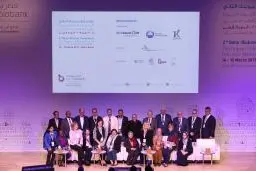PHOTO
Doha, Qatar, March 15, 2017
The second annual Qatar Biobank Conference concluded today at the Qatar National Convention Centre (QNCC) with a discussion on the potential creation of a regional biobank network in the Middle East and Africa.
“Such an initiative would be the natural next step for national biobanks,” said Dr. Asma Al Thani, Chairperson of Qatar Genome Programme Committee and Board Vice Chairperson of Qatar Biobank, in her closing remarks.
“With individual nations moving forward with their biobanking strategies, a regional biobank network would prove crucial in disseminating more knowledge about the impact that genes, lifestyle and environment have on health in this region,” Dr. Al Thani said.
The two-day event, held under the theme ‘The Impact of Biobanking on Precision Medicine Initiatives’, brought together top medical practitioners and researchers in biobanking, genomics and personalized medicine to discuss the field of biomedical science and the growing use of precision medicine to improve clinical outcomes.
The event hosted more than 400 delegates from around the world, including many of Qatar’s leading healthcare providers and researchers.
Dr. Nahla Afifi, Scientific and Education Manager and Acting Director of Qatar Biobank, presented findings from the initiative’s first 5,000 Qatari donors. The samples from that group revealed high levels of obesity, diabetes and Vitamin D deficiency.
Representatives from biomedical institutions in Jordan, Saudi Arabia, UAE, Egypt and Africa also presented their research and took part in a panel discussion on the possible formation of a regional biobank network.
“As we begin to gain more insight on the health of the local population, we are also beginning to look at how we can expand that picture. This conference is an excellent example of the value of collaboration, and can serve as a stepping-stone for future discussions about a regional biobank network,” said Dr. Afifi.
The goal of a regional biobank network would be similar to that of Qatar Biobank: to enable researchers to better understand why some people in a population are more predisposed to a particular preventable disease than others. Once researchers have determined the contributing factors that lead to an individual being more susceptible to a specific disease, they can then develop tailored treatments based on that individual’s unique medical history and genetic makeup — a practice known as ‘precision medicine’.
Dr. Al Thani concluded her remarks, saying: “As these past two days have shown, it’s through collaboration — whether through a conference or a regional biobank network — that we can achieve our common goal of building efficient and effective health systems that will give people everywhere the high-quality healthcare they deserve.”
For more information about Qatar Biobank, please visit: www.qatarbiobank.org.qa/home
-Ends-
About Qatar Biobank
Qatar Biobank, a member of Qatar Foundation for Education, Science and Community Development, is a population-based platform where biological samples are provided by participants. Through the collection of samples and information on the health and lifestyles of Qatari citizens and long-term residents, Qatar Biobank aims to make vital medical research possible for scientists in Qatar, the region and the world.
Launched in 2012 in collaboration with the Supreme Council of Health, Hamad Medical Corporation and supported by expert scientists from Imperial College London, Qatar Biobank completed the two-year operational pilot phase in 2015 marked by the official inauguration of the state-of-the-art facility by Her Highness Sheikha Moza bint Nasser, Chairperson of Qatar Foundation and Vice Chairperson of the Supreme Council of Health.
To learn more about Qatar Biobank and how to become a contributor, please visit: www.qatarbiobank.org.qa
Twitter: @Qatar_Biobank
For more information:
Please contact Abed Shirzai
+974 7021 8259
abeds@bljworldwide.com
© Press Release 2017




















